Violets "Cinderella's Dream": description of the variety, planting and care features

Violet "Cinderella's Dream" is very popular among lovers of these delicate flowers. She has several more names: viola, moth or pansies. In fact, the flower belongs to the genus Saintpaulia, in floriculture it is called the Uzambara violet. And although saintpaulias are not related to violets, in everyday life the plants are called "violets". There are already 500 varieties of violets, not counting the appearance of each individual sport.

Description of the variety
The violet "Cinderella's Dream" was created by the breeder A. Deykun. The plant is popular for both external characteristics and ease of care. Violet leaves have an interesting wavy shape. The upper part is deep green, and the reverse side is red. Flowering begins early, the petals of the flowers fall off after 1.5–2 weeks, but the peduncle can have up to 6 flowers. The total flowering period is 2 months.
The flowers are very beautiful, with corrugated petals. When they start to bloom are completely white. In the process of flowering, a border appears on them. Its shades can vary from delicate strawberry to brownish, giving the plant an original look. Sometimes the border can be light lilac. Each flower can be up to 4 cm in diameter. The flowers grow in a rosette. The rosette of this Saintpaulia is standard.



Content and rules of care
Saintpaulia "Cinderella's Dream" does not have any special differences in care from other violets, and in some moments is even more unpretentious, for which many flower growers love her. Plus, it fits perfectly into any decor. If you follow simple requirements, then it will not cause much inconvenience and trouble.
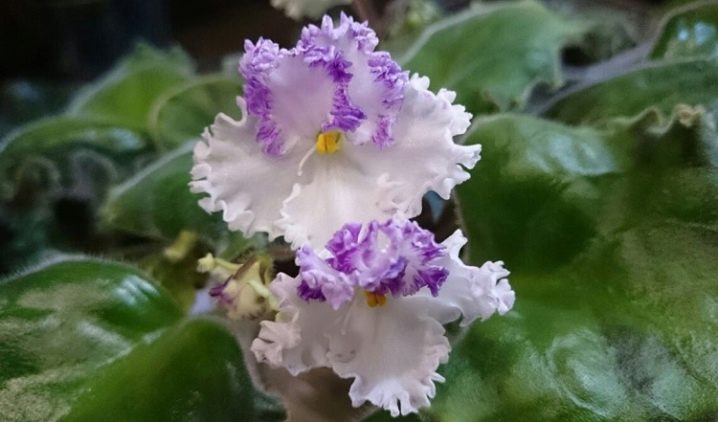
Light and temperature
The light should be bright and abundant, but not directly fall on the plant, as this can cause root rot and burns on delicate leaves. On the contrary, from a lack of light, the flower will become lethargic and wither. The light should hit the flower for 15 hours; in winter, lighting can be reduced to 11 hours. The brighter the light, the better it affects the flower, promoting profuse flowering. In constant darkness, the plant will stretch out its petioles, it will be loose and unlikely to bring many buds.
"Cinderella's Dream" is a capricious flower in terms of temperature control. If the plant is overheated or supercooled, it can die. The best temperature is + 22 °.
The humidity in the room with the violet should be up to 60%, while it is worth regularly ventilating, but watch out for the absence of drafts, and avoid cooling.

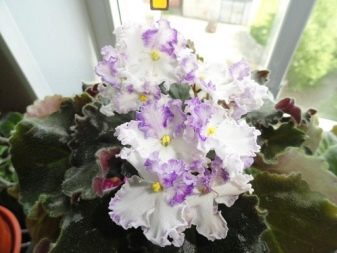
Watering and feeding
Too much moisture in the pot, as well as too dry soil, will not benefit Saintpaulia, so a clear approach to the organization of watering is needed. The ground should always be slightly damp. Watering "Cinderella's Dream" is necessary only when the topsoil dries up. The best method would be filtered irrigation, which allows the violet to independently adjust the amount of water in the ground.
A string with a diameter of 0.5 cm is inserted into the soil, through which liquid penetrates. The cross-section of the cord is selected according to the size of the container in which the flower grows. The cord is passed through the drainage layer and laid in a ring in the main part of the soil. The other end is in a container of water that sits directly under the pot. For good flowering, just proper watering will not be enough, so you can't do without top dressing. The composition of the fertilizer and the frequency of use depend on the season and stage of flower development:
- in winter, one feeding with organic substances is carried out;
- in the warm season (from spring to early autumn), fertilizers are applied once every 3 weeks;
- in the summer, you need to fertilize only if the plant begins to wither.
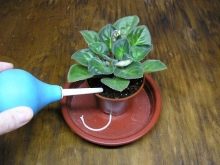

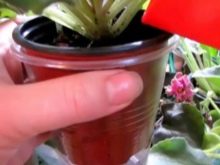
Pests and diseases
Many insects, such as aphids, ticks, flies, thrips and scale insects, can harm a delicate plant. As soon as the first signs of the appearance of parasites become noticeable, it is necessary to get rid of the infected leaves and, at intervals of a week, spray the violet with insecticides three times.
If you do not follow the rules for caring for a violet, this can lead to the following troubles:
- with constant sharp changes in temperature and humidity, powdery mildew may appear;
- watering with cold water and drafts cause fusarium;
- if the leaves are constantly poured with water during watering, they begin to rot;
- too wet ground and lack of light will cause late blight.
Each of the diseases, unfortunately, is treatable only at an early stage, and if it is not detected and acted upon in time, the violet will die. A diseased plant is removed from diseased leaves and roots, transplanted and thoroughly sprayed with fungicides.
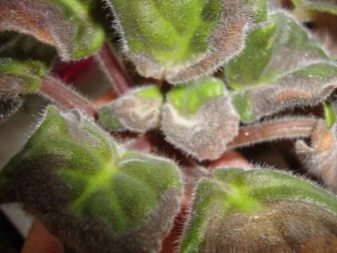
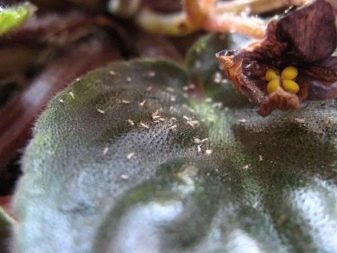
Transfer
Transplanting the plant into a new pot of fresh soil every year helps the plant to obtain nutrients for proper growth and development. It is necessary to transplant "Cinderella's Dream" in the spring after the onset of steady heat. Sometimes it is necessary to transplant a violet when it becomes clear that the flower is uncomfortable in the old soil, it starts to wither or stops blooming. An unscheduled transplant does not require a specific time of the year.
The soil for violets should be as loose as possible. The best composition would be a mixture:
- turf - 5 parts;
- leafy soil - 5 parts;
- peat - 3 parts;
- sand - 1 part;
- vermiculite - 1 part.
To make the substrate more nutritious and have disinfecting properties, a little wood ash and moss are added to the soil. You can take the finished composition from the store, but then you will need to add vermiculite or perlite there. The pot for the plant should be about 12 cm in diameter, since it will bloom only after filling the entire space with roots.
At the bottom of the pot there should be a drainage in the form of expanded clay or foam.

Reproduction
Violet "Cinderella's Dream" can be propagated vegetatively.
- Leafy cutting. The leaf should be healthy, free from damage or yellow spots. It is carefully cut off on the 2nd row of the outlet, and then placed in a glass of water in a suspended state so as not to damage the sheet. When the cutting leaves roots 1 cm long, the leaf is transplanted into a glass with sand and soil in a 1X1 ratio, where it can be immediately rooted. After a month, the stalk begins to give off shoots, which, when a diameter of 3 cm is reached, are planted in separate pots.
- Stepsons and their rooting. This method will allow you to preserve all the features of the variety, but at the same time get an earlier flowering than when propagated by the cuttings method. The stepsons must be separated from the main plant with tweezers and planted in separate containers with sand and soil.
Each stepson must have at least 3 leaves and roots.
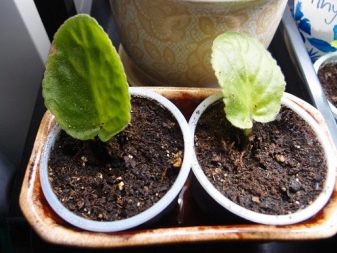
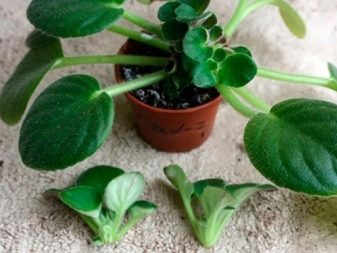
Reviews
Those who have tried to cultivate "Cinderella's Dream" always speak positively about the flowering of violets, comparing a hat made of flowers with a cloud. Florists are pleased with the unusual color of the petals, the neat look of the plant and how modest, but at the same time it looks spectacular, as if it really came from a fairy tale. Of course, not everyone likes that the flowers are small at first, but after re-flowering, they usually increase in size.


You can find out how to grow a violet from a leaf below.































And mine is not like that.
The comment was sent successfully.